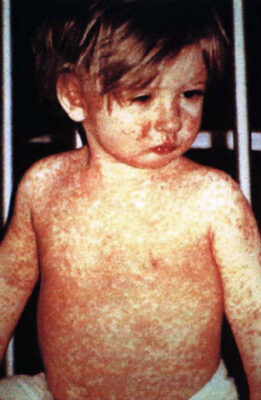YEREVAN (news.am) — Measles cases across Europe, including Armenia, continue to surge, with the number of measles cases recorded in Armenia this year have already reached the total number of cases reported throughout 2023. In 2023, 545 confirmed cases of measles have been registered in Armenia, 382 of which were children. As of 5 August, 2024, already 543 confirmed cases of measles have been registered in Armenia, 323 of which are children, UNICEF Armenia reported on Tuesday, August 13.
According to the latest available data, 56,634 measles cases and four deaths were officially reported across 45 out of 53 countries in the WHO European Region during the first three months of 2024. Throughout 2023, 61,070 cases and 13 deaths were reported by 41 countries. In Armenia, one death was recorded in 2023.
“Measles cases continue to rise both globally and in Armenia. The epidemic situation may become somewhat aggravated due to the tourism season. I am grateful to our international partners, particularly to UNICEF, with whom our joint campaigns contribute to raising awareness among the population both on avoiding the complications from measles, as well as on the importance of measles vaccinations. This leaves a direct impact on reducing measles infection and mortality rates. I would like to stress that measles is not an ordinary rash, it is highly contagious and spreads quickly among unvaccinated or incompletely vaccinated people. Parents of children who have not received their measles vaccine should contact their polyclinic and vaccinate their children. Previously unvaccinated and incompletely vaccinated persons are also subject to vaccination,” said Lena Nanushyan, First Deputy Minister of Health.
“An increase in measles cases is a clear sign of a breakdown in immunization coverage. As cases of measles continue to surge, we need urgent action to both strengthen health systems and implement effective public health measures to secure protection of all children from this dangerous but preventable disease,” said Christine Weigand, UNICEF Representative in Armenia. “In Armenia, we support the Ministry of Health with necessary capacity building of healthcare professionals on childhood immunization, providing support in strengthening cold chain and technical equipment from the national level to ambulatories, and working through regional parental education centers to support present and expecting parents with evidence-based information on vaccines.”
Measles is one of the most contagious diseases in the world, spread when an infected person breathes, coughs or sneezes. The virus remains active and contagious in the air or on infected surfaces for up to 2 hours. Any non-immune person can become infected. A prominent rash is the most visible symptom, while complications can include blindness, encephalitis, severe diarrhea and related dehydration, ear infections and pneumonia.
Measles has a devastating effect on children’s health, with young children most at risk of severe complications. High rates of hospitalization and long-lasting weakening of children’s immune systems make children more vulnerable to other infectious diseases. More than half of those who contracted measles in the WHO European Region in 2023 were hospitalized, demonstrating the severe burden on individuals, families and health care systems.








